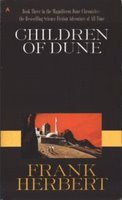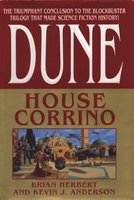 About 10 years after the events of "Dune Messiah," the children of Emperor Paul Maud'dib are aware of their future and fate of humanity under their guidance. Leto II and Ghanima are young of age but being "pre-born" they have all the knowledge of mankind and prescience vision which allows them to forsee what events will guide humanity. The Golden Path must be followed by one of these children of Maud'dib but which one? The Golden Path is one in which Paul could not take.
About 10 years after the events of "Dune Messiah," the children of Emperor Paul Maud'dib are aware of their future and fate of humanity under their guidance. Leto II and Ghanima are young of age but being "pre-born" they have all the knowledge of mankind and prescience vision which allows them to forsee what events will guide humanity. The Golden Path must be followed by one of these children of Maud'dib but which one? The Golden Path is one in which Paul could not take. In the meantime Dune continues to become "green." Many sections of desert have standing water and clouds can be seen from the Guild's highliners in space. The ecology of Dune is changing to allow growth of plant life. The problem with this is that it could lead to the extinction of Sandworms which are the source of spice and spice is what keeps the the Universe running.
House Corrino is making an attempt at regaining the throne by training tigers to attack Leto & Ghanima and then put Farad'n on the throne. But Farad'n does not really seem to like what is done in his name by his mother. He then banishes his mother upon the arrival of Lady Jessica and Lady Jessica begins training him in the Bene Gesserit way. All this time they are trying to betroth him to Ghanima, who believes the assasination succeeded and killed Leto. Leto, however is seeking out Jacurutu in order to find the Golden Path.
Alia has pushed along the religion of Paul Maud'dib in order to gain power for herself. This is not entirely her doing, because she becomes possessed by the memory of Baron Harkkonen. A mysterious figure makes his appearance in the city to tell the people of the abomination of worshipping Maud'dib. This person is known only as The Preacher. The Preacher however is Paul Maud'dib returned from the desert.
Leto learns that the Golden Path is to transform his human self by merging with the sand trout (the "larvae" of the sandworms).
Once again Frank Herbert creates a novel that continues with the great science-fiction action and intrigue, philosophical discussions and ecological warnings.



